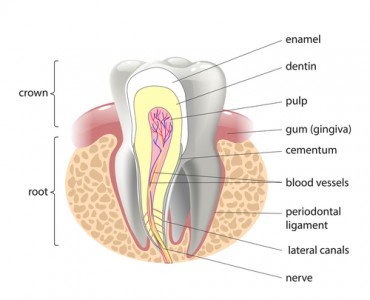Tooth Sensitivity and Your Oral Health
 If you are like many people, biting into a popsicle or drinking a hot cup of coffee can cause unbearable pain. For some people, brushing and flossing can also result in discomfort. Tooth sensitivity is a common problem, but many people just assume that their teeth are naturally sensitive to temperature. However, tooth sensitivity is indicative of a more serious oral health problem for which you should seek professional treatment.
If you are like many people, biting into a popsicle or drinking a hot cup of coffee can cause unbearable pain. For some people, brushing and flossing can also result in discomfort. Tooth sensitivity is a common problem, but many people just assume that their teeth are naturally sensitive to temperature. However, tooth sensitivity is indicative of a more serious oral health problem for which you should seek professional treatment.
What Causes Tooth Sensitivity?
Tooth sensitivity occurs when the nerve of the tooth is exposed to cold or hot temperatures. Enamel protects the tooth’s crown, and cementum protects the tooth’s root. Dentin lies underneath enamel and cementum and surrounds the tooth’s blood vessels and nerve. Nerve exposure occurs when either tooth enamel has worn away or when the root of the tooth is exposed through a crack or gum recession. Tooth decay, like cavities, can also cause increased tooth sensitivity and pain.
Worn Enamel
Your enamel protects the surface of your teeth and provides a strong barrier between the dentin and nerve. However, improper hygiene habits often lead to enamel erosion. Aggressive brushing and abrasive toothpaste can wear down your enamel. Highly acid foods and teeth-whitening products can also break down your surface enamel. Enamel breakdown exposes the dentin, causing your nerve to be more sensitive to temperature.
Periodontal Disease
Aggressive brushing can injure your gums, exposing the roots of your teeth. Damaged gums can also increase your risk of developing periodontal disease, an infection in the gums and bone. Untreated gum disease increases bacteria, which can destroy cementum, bone, and other dental tissues, causing nerve exposure and pain.
Grinding Teeth
Grinding your teeth has a number of negative side effects. Most people only think about the pain it causes in your jaw; however, this isn’t the only pain-causing effect. Grinding your teeth places pressure on the tooth enamel. Chronic tooth grinding can lead to cracks in your enamel, which exposes the dentin of the tooth and your nerves.
Treating Tooth Sensitivity
Treatment for tooth sensitivity varies depending on the cause of the problem. Dr. Fiss will help diagnose the cause of your tooth sensitivity and recommended the necessary course of action, which may include one or more of the following:
- A desensitizing toothpaste can block sensation from the tooth’s nerve, but it requires several applications to become effective. Dr. Fiss recommends MI Paste™, which contains fluoride, calcium, and phosphate.
- In-office fluoride gel treatment or special desensitizing agents applied to sensitive areas can improve sensitivity.
- Custom night guards can be used for patients who grind their teeth.
- Fillings, crowns, and gum therapy can treat cracks, chips, and decay.
- Surgical gum grafts can cover and protect the tooth’s root, reducing sensitivity.
- A root canal can treat hypersensitivity caused by an infection.
If you suffer from sensitive teeth, schedule a consultation with Dr. Benjamin Fiss today. Contact our office at (312) 642-6631 or fill out our online contact form for additional information.